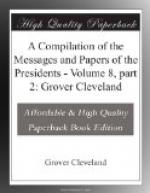In this emergency the President felt it his duty to employ with energy the extraordinary powers which the Constitution confides to him in cases of insurrection. He called into the field such military and naval forces, unauthorized by the existing laws, as seemed necessary. He directed measures to prevent the use of the post-office for treasonable correspondence. He subjected passengers to and from foreign countries to new passport regulations, and he instituted a blockade, suspended the writ of habeas corpus in various places, and caused persons who were represented to him as being or about to engage in disloyal and treasonable practices to be arrested by special civil as well as military agencies and detained in military custody when necessary to prevent them and deter others from such practices. Examinations of such cases were instituted, and some of the persons so arrested have been discharged from time to time under circumstances or upon conditions compatible, as was thought, with the public safety.
Meantime a favorable change of public opinion has occurred. The line between loyalty and disloyalty is plainly defined. The whole structure of the Government is firm and stable. Apprehension of public danger and facilities for treasonable practices have diminished with the passions which prompted heedless persons to adopt them. The insurrection is believed to have culminated and to be declining.
The President, in view of these facts, and anxious to favor a return to the normal course of the Administration as far as regard for the public welfare will allow, directs that all political prisoners or state prisoners now held in military custody be released on their subscribing to a parole engaging them to render no aid or comfort to the enemies in hostility to the United States.
The Secretary of War will, however, in his discretion, except from the effect of this order any persons detained as spies in the service of the insurgents, or others whose release at the present moment may be deemed incompatible with the public safety.
To all persons who shall be so released and who shall keep their parole the President grants an amnesty for any past offenses of treason or disloyalty which they may have committed.
Extraordinary arrests will hereafter be made under the direction of the military authorities alone.
By order of the President:
EDWIN M. STANTON,
Secretary of War.
The President’s Thanks to the Forces That Captured
Fort Henry and
Roanoke Island.
WASHINGTON CITY, D.C., February 15, 1862.
The President, Commander in Chief of the Army and Navy, returns thanks to Brigadier-General Burnside and Flag-Officer Goldsborough, and to Brigadier-General Grant and Flag-Officer Foote, and the land and naval forces under their respective commands, for their gallant achievements in the capture of Fort Henry and at Roanoke Island. While it will be no ordinary pleasure for him to acknowledge and reward in a becoming manner the valor of the living, he also recognizes his duty to pay fitting honor to the memory of the gallant dead. The charge at Roanoke Island, like the bayonet charge at Mill Springs, proves that the close grapple and sharp steel of loyal and patriotic soldiers must always put rebels and traitors to flight.




